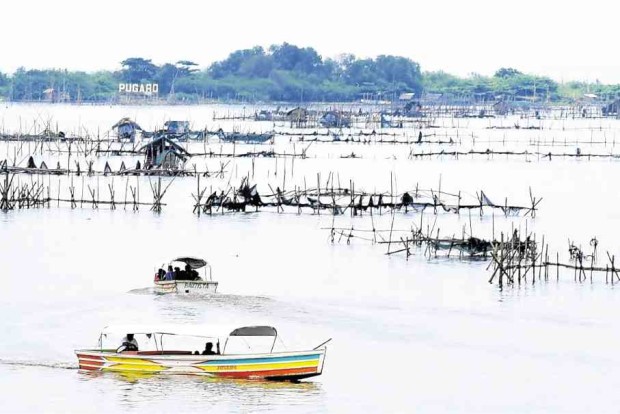
FISH traps and pens built along the Calmay River in Dagupan City. WILLIE LOMIBAO / Inquirer Northern Luzon
The Department of Environment and Natural Resources (DENR) issued on Saturday its “last call” to owners and operators of fish pens and cages in Laguna de Bay to conduct “self-demolitions” before it starts clearing the freshwater lake of illegal structures later this month.
“Once we begin the operation, all assets affected by our dismantling activities will be confiscated in favor of the government,” said DENR Undersecretary Arturo Valdez, who also heads the National Anti-Environmental Crime Task Force (NAECTF).
“There are posts there [and nets], that’s why it’s better for the owners to dismantle it themselves. You take care of your materials, those are expensive after all,” Valdez said.
He said all aquaculture facilities in the lake area will be covered by the dismantling operations, since permits given to operators expired on Dec. 31, and the DENR would implement a moratorium on permit renewal and application this year.
DENR undersecretary for legal services Maria Paz “Ipat” Luna last month said the moratorium was suggested by experts to provide a “breather” for the lake while allowing “open-fishing” in the meantime.
Valdez said the DENR and the Laguna Lake Development Authority (LLDA) are now mapping out a “phase-by-phase approach” to the clearing operation.
The permit moratorium and the clearing operation are in accordance with President Duterte’s directive, issued during his State of the Nation Address in July last year, to dismantle corporate and private fish pens and cages to give more opportunities for small fisherfolk to earn a living off the lake.
DENR Secretary Gina Lopez has said the lake was “overfished” and around 400,000 houses discharge their sewage into the lake. To address the problem, the DENR needs to coordinate with local government units to install sewage treatment plants, she said.
“Our passion and desire is to convert Laguna Lake into an ecotourism zone,” Lopez said.
Valdez noted the pens obstruct natural water flow and efforts to remove pollutants.
According to the LLDA, the lake’s current carrying capacity allows only 9,000 hectares for aquaculture, but pens and cages have occupied about 12,375 ha, 3,375 more than what is allowed.
Unregistered operators number 2,261 and occupy 2,856 ha. The 1,018 registered operators account for a total of 9,519 ha, the LLDA said.